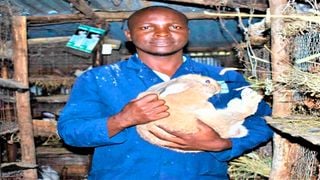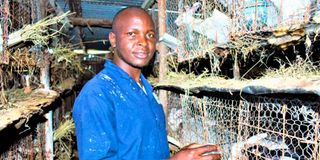
Emmanuel Adundo with some of his rabbits in Syokimau.
Seeds of Gold
Premium
Emmanuel Adundo: How I have made rabbit farming work
Syokimau, a popular residential estate on the outskirts of Nairobi, can best be described as a perfect place for urban farming.
Here, one finds space to grow some crops and keep livestock as most residents are homeowners and more importantly, the area’s dense population offers a superb market.
Emmanuel Adundo, 34, runs his rabbit business in the estate, keeping some 400 animals. Dressed in a green overcoat, Seeds of Gold team finds him attending to his rabbits.
"I call my business Genrab Rabbit Farm. I started it in 2019 as a hobby since I loved rabbits and I had the space," says Adundo, who holds a Bachelors in Agricultural Biotechnology from Moi University.
He started with a capital of Sh10,000 from his savings, which he used to buy four rabbits, a buck and three does.
Californian white
"Part of the money also went on construction of rabbit cages. The number has grown since then. The good thing is that rabbits are prolific animals; they reproduce faster thus currently I’ve close to 400 animals,” says the farmer, who visited a commercial rabbit farm and did research on YouTube before embarking on the business.
He keeps New Zealand white, Californian white, Chinchilla, Dutch, Havana and Flemish giant breeds.
“I keep a variety because each has different qualities, for instance, some are good at breeding, others grow faster thus reach market weight faster. Some farmers need specific breeds. Also, I sell as pets to individuals, who are mainly attracted by the colour,” says Adundo, who has constructed the rabbit cages at least a metre from the ground with wire mesh and not wood for good hygiene and easy collection of urine.

Emmanuel Adundo with some of his rabbits in Syokimau.
He feeds his rabbits hay, pellets that go for Sh2,200 per 50kg bag and wilted grass and weeds. “I also make sure there’s constant supply of clean water all the time for my rabbits. The grass must be wilted to avoid bloating,” Adundo says.
Early in the morning, he feeds them hay and some wilted greens, while in the evening, he gives them pellets.
“I buy pellets and hay from a nearby agrovet, while greens I get them from the shamba and field.”
Inbreeding
Adundo does the business with his wife, though, he has employed one person to assist them.
“Generally, a rabbit is ready for slaughter after four months while at fifth, the doe is ready to be mated, while at sixth, a buck is ready to mate,” he explains.
To control inbreeding, Adundo gets male rabbits from different farms for breeding.
“I sell the rabbits both for meat and to other farmers who want to rear the animals. A kilo of dried rabbit meat goes for Sh700 ,” he says.
Adundo notes that being white, rabbit meat has huge demand in Nairobi and its environs as it is nutritious, has no cholesterol and contains little sodium.
“I have ways of getting customers. First, I do a lot of online marketing on Facebook. Second, is by word of mouth and referrals. Sometimes I give a free sample of cooked meat and after testing it, people end up liking it,” reveals the farmer.
He acknowledges that the market for rabbit products is still small, but he has overcome this by being an aggressive marketer.
“Constant marketing and introducing the rabbit meat to different people helps a lot. I give free samples to friends, neighbours and new clients to attract them,” says the farmer.
One of the problems he has experienced in the business is the sudden death of the animals. “Some rabbits don’t show symptoms when they are sick. You just find them dead, thus the animals need great care.”
The most common diseases are coccidiosis and blotting, especially of young rabbits.
“I control the latter mostly by avoiding wet greens and giving rabbits much hay. For coccidiosis, vaccination helps.”
Besides meat, he sells rabbit urine at Sh50 a litre, and manure at Sh300 for a 50kg bag. “Rabbit manure has high nitrogen that crops need. Urine is used as fertiliser when mixed at a ratio of 1:5 and as a pesticide when used in a ratio of 1:3.”
1,500 rabbits
His plan is to have more than 1,500 rabbits, set up a rabbit eatery centre, and do vibrant value addition in rabbit meat.
Adundo advises those who want to venture into rabbit farming to visit established farms first, and do thorough research to understand the dynamics. “Lastly, be patient as the business has many ups and downs.”
Dr Wyckliff Ng’etich, a lecturer in the Department of Veterinary Surgery, Theriogenology and Medicine at Egerton University, notes that sudden death of rabbits can be caused by poisoning, fright/stress, gastrointestinopathies or sudden change of environment.
“Greens/weeds harvested from the field might contain poisonous plants but commercial feeds are safe only when all the requirements on storage and transportation/application are adhered to.”
To avoid such losses, farmers should ensure that they feed their rabbits with appropriate fresh greens or commercial feeds, he says, adding that maintaining high standards of hygiene in rabbit enclosures, proper stocking rates and seeking veterinary advice on disease control helps.





